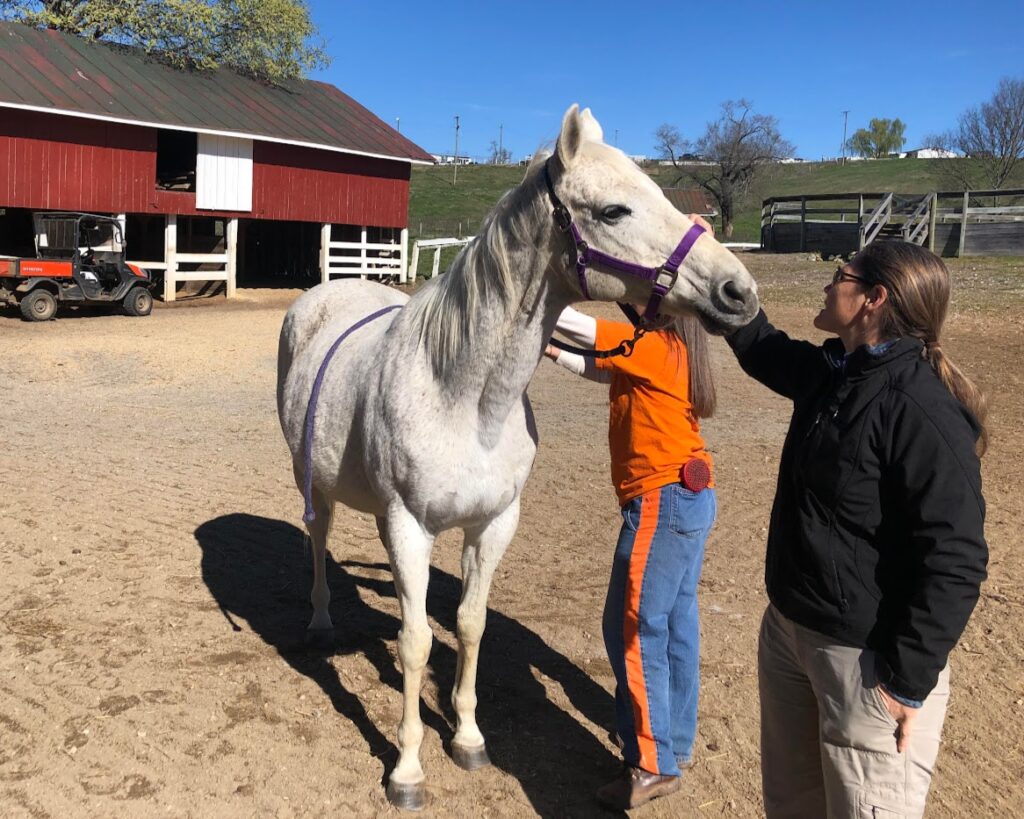Newest Member of the Virginia Equine Alliance, and recent Lock Haven University graduate Aidan Turnage-Barney recently visited the James River Horse Foundation in Goochland, VA these were his thoughts.
Those of us who love horses know that there is a special magic between a girl and her horse. It’s a romantic ideal encouraged by movies like Horse Girl and National Velvet, but a recent visit to the James River Horse Foundation at the State Farm Work Center in Goochland County reminds us that the connection between a woman and a horse can be healing and redeeming.

The program is dedicated to taking retired thoroughbreds and giving them a safe and happy home. This program is unique because they provide injured horses a safe refuge when they have no more opportunities on the racetrack.
The other purpose of the program is to teach the inmates at the facility the skills involved with taking care of a thoroughbred.

Program Manager Cynthia (CJ) Weldon and Assistant-Warden Michael Lewis proudly offered a tour of the facility and the farm. “The participants are in the program handling, grooming, and then going on to learn how to tack and how to shoe, braid and do all kinds of things like that,” explained Walden. “The kind of skills that they can take out into the industry and potentially use.” She reports that several of the participants in the program have been released and continued on to have careers in the equine industry.
Mr. Lewis spoke of how much he believes the opportunity to work with horses has been the best thing for the incarcerated women in the prison. “The quiet of the farm and the attention to detail required to take care of a horse, helps create a sense of balance for the prisoners that is not easily achieved by incarcerated individuals.”
The program was started 15 years ago for male inmates at a neighboring prison; in 2019 they moved the project to the female prison. Weldon says that, since the program was made available at the women’s prison, she is aware of only one inmate who had been in the horse program being returned to the penal system. The project is an important measure in preparing these individuals to return to normal life and to be productive and contributing members of society.
”They walk out of here with a really rounded understanding of care that is very marketable in the industry,” said Wledon. “They get other skills as well, responsibility, setting boundaries, taking charge, and just doing what they need to do. I think it’s a good program, the horses provide them with this opportunity to grow as individuals and to secure job skills.”
The farm currently houses 24 thoroughbreds, almost all of which have a racing background, with a few coming from the world of show horses. The barn has three relatives of Secretariat: Covert Action, a grandson; Multiple Choice, a Great-Grandson with $800,000 in career winnings; and Scared Guy, a Great-Great-Great Grandson who was purchased as a Yearling for $250,000 but never ran a race because of his fear of the starting gate. The 24 horses rotate and every day a different group is brought in to be groomed extensively in their stalls. The rest are fed and checked in the fields. All the horse care is provided by the inmates in the facility apart from occasional visits from the veterinarian.
When asked if there was a favorite horse among the inmates, Weldon responded that everyone had their own favorite, typically the one that the individuals had spent the most time working with one on one. We asked some of the inmates who their favorite was and almost all chose the horse they were currently grooming. They spoke with pride about the horses and were very excited to have the horses they had taken such good care of photographed.
In my time in the facility, I was stunned by how serene the farm felt; you can truly feel the dedication from these women towards their horses and it is clear that they have learned enough to be knowledgeable of these animals and how to take care of them at the highest level. These skills will immediately give the women an opportunity after release to go to a racetrack and get a job that often includes housing, which is a huge problem for individuals when they are first released. The James River Horse Foundation is working every day to give these horses the best life they can possibly live, and in the process are helping these women build futures brighter than those they might have faced without this program.

